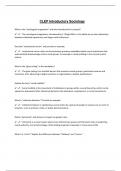CLEP Introductory Sociology
What is the "sociological imagination" and who introduced this concept?
✔️✔️ The sociological imagination, introduced by C. Wright Mills, is the ability to see the relationship
between individual experiences and larger social influences.
Describe "institutional racism" and provide an example.
✔️✔️ Institutional racism refers to discriminatory practices embedded within social institutions that
systematically disadvantage certain racial groups. An example is racial profiling in the criminal justice
system.
What is the "glass ceiling" in the workplace?
✔️✔️ The glass ceiling is an invisible barrier that prevents certain groups, particularly women and
minorities, from advancing to higher positions in organizations, despite qualifications.
Explain the term "social mobility."
✔️✔️ Social mobility is the movement of individuals or groups within a social hierarchy, which can be
upward or downward, often influenced by factors like education, employment, or social connections.
What is "collective behavior"? Provide an example.
✔️✔️ Collective behavior is spontaneous social action by a group of people in response to an event or
situation, such as protests, mobs, or public demonstrations.
Define "patriarchy" and discuss its impact on gender roles.
✔️✔️ Patriarchy is a social system where men hold primary power and dominate roles in leadership,
moral authority, and social privilege, often leading to gender inequality in many areas of life.
What is a "norm"? Explain the difference between "folkways" and "mores."
,✔️✔️ A norm is a rule or guideline in society about acceptable behavior. Folkways are informal norms
for everyday behavior, like manners, while mores are strongly enforced norms tied to morality, like
prohibitions against theft.
Explain the "functionalist perspective" on social structures.
✔️✔️ The functionalist perspective views society as a complex system with interdependent parts
working together to maintain stability and order, with each part serving a function in society.
What is "symbolic interactionism" in sociology?
✔️✔️ Symbolic interactionism is a perspective focusing on how individuals interact and create
meaning through symbols, language, and gestures, emphasizing the role of subjective interpretation in
social interactions.
Describe the concept of "capital" in relation to social class, as introduced by Pierre Bourdieu.
✔️✔️ Pierre Bourdieu introduced the concept of capital beyond just economic wealth, including social
capital (connections), cultural capital (knowledge and skills), and symbolic capital (status and
recognition), all of which influence social class.
What is a "peer group," and what role does it play in socialization?
✔️✔️ A peer group is a social group of individuals of similar age, status, and interests that plays a
significant role in socialization, influencing behaviors, values, and identity.
Define "total institution" and give an example.
✔️✔️ A total institution is a place where individuals are isolated from society and controlled by an
authority, with strict norms and routines. Examples include prisons, military boot camps, and psychiatric
hospitals.
Explain the term "stigma" and how it can impact individuals.
✔️✔️ Stigma is a powerful negative label that affects a person's identity and social interactions, often
leading to discrimination and isolation from others.
What is "cultural capital," and how does it affect social mobility?
, ✔️✔️ Cultural capital refers to non-financial assets like education, language, and cultural knowledge,
which influence social mobility and opportunities within society.
Describe the concept of "intersectionality" in sociology.
✔️✔️ Intersectionality is the study of how different aspects of identity (e.g., race, gender, class)
intersect and create unique experiences of discrimination or privilege.
achieved status ✔️✔️A status that individuals secure on the basis of choice and competition.
altruistic suicide ✔️✔️type of suicide that occurs where ties to the group or community are
considered more important than individual identity
affiliation motivated ✔️✔️when one's actions are geared to helping them join or connect with a
particular social status
agricultural societies ✔️✔️Societies that cultivate large amounts of crops with the plow and other
relatively advanced tools and equipment.
egoistic suicide ✔️✔️suicide that results from social isolation and individualism
fatalistic suicide ✔️✔️suicide that occurs as a result of "too much" social regulation
anomic suicide ✔️✔️Suicide that occurs as a result of "too little" social regulation
anomie ✔️✔️A social condition in which people find it difficult to guide their behavior by norms they
experience as weak, unclear, or conflicting.
ascribed status ✔️✔️social position a person receives at birth or involuntarily later in life
status ✔️✔️a social position that a person holds




